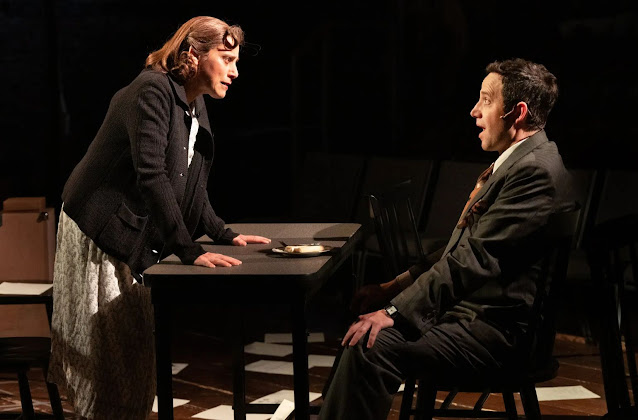 |
| Allison Janney and Corey Hawkins in Six Degrees of Separation. (Photo: Joan Marcus) |
The current Broadway revival of John Guare’s Six Degrees of Separation begins badly and doesn’t find its feet until its leading lady, Allison Janney, does – about two-thirds of the way through, during her reading of the speech that gives the play its title. The play, a brilliant high comedy, is about the way a young hustler named Paul disrupts the lives of a number of people whose paths he crosses, most (but not quite all) of whom belong to the New York elite of the last decade of the twentieth century. Paul is an outsider in every conceivable way: he’s black (race in this play equates to class), gay and homeless. When a moneyed M.I.T. undergraduate named Trent Conway picks him up on the streets of Boston and takes him home, Paul makes a deal with him – sex in exchange for information about the prep-school classmates in Trent’s address book, now enrolled at various Ivy League colleges. (Trent is delighted to furnish details: not only does he consider he’s getting fair return for the favor, but his sexuality has always made him feel like an outsider too; he fantasizes that he can turn Paul into such an appealing faux aristocrat that when Trent shows up on his arm everyone will just have to accept them both.) Then Paul presents himself at the doors of their parents, bleeding from a self-inflicted stab wound he says he incurred during a mugging, claiming to know their children. He also professes to be the son of Sidney Poitier, and all of the aristocrats whose homes he’s entered on false pretenses are sufficiently impressed to take him in for the night. Paul is a scam artist and a narcissist; he’s also, it turns out, delusional. He starts to believe he really is Sidney Poitier’s son, and then he believes his other invention: that he’s the illegitimate son of Flan Kittredge, the art dealer who, along with his wife Ouisa, shows him the most kindness. Six Degrees of Separation is about connection and imagination as well as class (a theme of all high comedy). But it isn’t centrally about Paul. He’s the catalyst whose interactions with those he comes across – Trent and the aspiring, adventure-seeking young actor from Utah, Rick (Rick and his wife Elizabeth also take Paul in, when they find him sleeping in Central Park) and the Kittredges – act in various ways on their imaginations. The protagonist of the play is Ouisa, who undergoes the most profound change as a result of meeting him.


